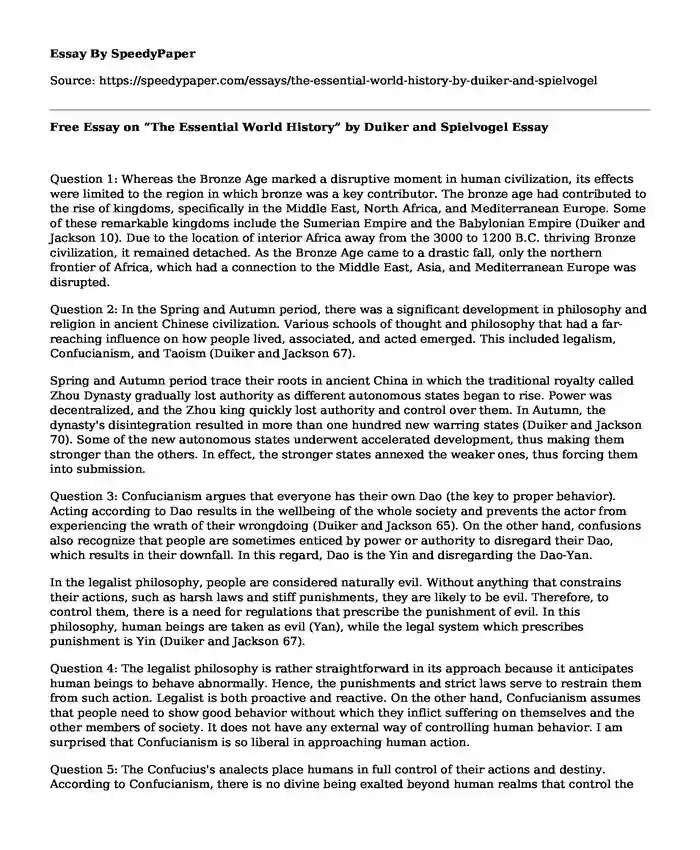Question 1: Whereas the Bronze Age marked a disruptive moment in human civilization, its effects were limited to the region in which bronze was a key contributor. The bronze age had contributed to the rise of kingdoms, specifically in the Middle East, North Africa, and Mediterranean Europe. Some of these remarkable kingdoms include the Sumerian Empire and the Babylonian Empire (Duiker and Jackson 10). Due to the location of interior Africa away from the 3000 to 1200 B.C. thriving Bronze civilization, it remained detached. As the Bronze Age came to a drastic fall, only the northern frontier of Africa, which had a connection to the Middle East, Asia, and Mediterranean Europe was disrupted.
Question 2: In the Spring and Autumn period, there was a significant development in philosophy and religion in ancient Chinese civilization. Various schools of thought and philosophy that had a far-reaching influence on how people lived, associated, and acted emerged. This included legalism, Confucianism, and Taoism (Duiker and Jackson 67).
Spring and Autumn period trace their roots in ancient China in which the traditional royalty called Zhou Dynasty gradually lost authority as different autonomous states began to rise. Power was decentralized, and the Zhou king quickly lost authority and control over them. In Autumn, the dynasty's disintegration resulted in more than one hundred new warring states (Duiker and Jackson 70). Some of the new autonomous states underwent accelerated development, thus making them stronger than the others. In effect, the stronger states annexed the weaker ones, thus forcing them into submission.
Question 3: Confucianism argues that everyone has their own Dao (the key to proper behavior). Acting according to Dao results in the wellbeing of the whole society and prevents the actor from experiencing the wrath of their wrongdoing (Duiker and Jackson 65). On the other hand, confusions also recognize that people are sometimes enticed by power or authority to disregard their Dao, which results in their downfall. In this regard, Dao is the Yin and disregarding the Dao-Yan.
In the legalist philosophy, people are considered naturally evil. Without anything that constrains their actions, such as harsh laws and stiff punishments, they are likely to be evil. Therefore, to control them, there is a need for regulations that prescribe the punishment of evil. In this philosophy, human beings are taken as evil (Yan), while the legal system which prescribes punishment is Yin (Duiker and Jackson 67).
Question 4: The legalist philosophy is rather straightforward in its approach because it anticipates human beings to behave abnormally. Hence, the punishments and strict laws serve to restrain them from such action. Legalist is both proactive and reactive. On the other hand, Confucianism assumes that people need to show good behavior without which they inflict suffering on themselves and the other members of society. It does not have any external way of controlling human behavior. I am surprised that Confucianism is so liberal in approaching human action.
Question 5: The Confucius's analects place humans in full control of their actions and destiny. According to Confucianism, there is no divine being exalted beyond human realms that control the earth. In essence, responsibility for good or evil is within the control of humans themselves, and the consequences of human greed are suffering. Confucius considers virtue as the distinctive quality which differentiates one person from the other. While Confucianism affirms the central role of humanity in being key players in determining their own lives for better or worse, it assumes that virtuous acts are similar across the human realms. In contrast, it also classifies people as innately conscious, learned, and unlearned (Duiker and Jackson 66). According to the philosophy, the innately conscious and learned people are higher in the order of human beings, which implies virtue cannot be naturally acted the same way. The analects primarily emphasize on virtue, filial piety, humaneness, and ritual.
Works Cited
Duiker, William J, and Jackson J. Spielvogel. The Essential World History. , 2017. Print.
Cite this page
Free Essay on "The Essential World History" by Duiker and Spielvogel. (2023, Sep 27). Retrieved from https://speedypaper.net/essays/the-essential-world-history-by-duiker-and-spielvogel
Request Removal
If you are the original author of this essay and no longer wish to have it published on the SpeedyPaper website, please click below to request its removal:
- The Things They Carried - Book Review in a Free Essay Example
- Literary Essay about the Setting of The Story of an Hour
- Comparative Literature Essay, Free Example for Everyone
- Free Essay Sample with SWOT Analysis for Eddie Stobart
- Free Essay in American History: The Advertised Aims of the American Civil War
- What is database performance tuning? Paper Example
- Essay Example: Improving Accessibility to Quality Healthcare in Jamaica
Popular categories





